2012年考研英语(一)翻译参考译文
2012年考研英语阅读全文翻译

“来吧,大家都在这样做”,这句低声说出的话,有一半成分是邀请,一半是强迫,在听到“朋友压力”这个词时,大多数人会想到这句话。
这句话通常会导致毫无益处的事情——饮酒,吸毒以及随意的性行为。
在缇娜·罗森博格的新书《加入俱乐部》中认为同辈压力通过她所谓的“社会治愈”也可以成为一种积极的力量,在这种治愈中组织和官员可以利用这种集体动力的能量帮助提高人们的生活,甚至是那句话。
罗森博格是普利策奖的获得者,她列举了许多在运转的社会治愈的例子:在南卡罗莱纳州发起了一个叫做强烈反对烟雾的反吸烟项目,目的是使香烟不再酷。
在南美,发起了一个叫做热爱生活的艾滋预防项目,招募了年轻人在他们的朋友中宣传性安全。
这个想法似乎是可行的,她是一个有感知力的观察者。
他对于公共健康活动的软弱无力做出的评论正中要点:他们没有将同辈压力转变为健康的习惯,而且他们显示出了一种对心理学严重错误的理解。
“你敢与众不同吗,那就不要吸烟!”兴起了一个以在青年人中减少吸烟为目的的标语运动,这些青年人想做的只是融入。
罗森博格的建议令人信服:公共健康支持者应该向广告商取经,他们很擅长于应用同辈压力。
但对于社会治愈的综合效力,罗森博格并没有说服力。
她的书中充满了太多无关的细节,没有足够的社会和生物原因来解释同辈压力为何如此巨大。
我们可以看出社会治愈最明显的缺陷就是,从长期来看,它的作用并不好。
一旦资金被削减,反烟运动就会失败。
只有有限的和杂乱的证据可以证明热爱生活运动可以引起长远的改变。
毫无疑问我们的朋友圈对我们的行为产生巨大的影响。
一个新出现的研究机构表示,积极健康和坏习惯都通过社交在朋友圈中传播。
这是同辈压力一个隐秘的形式:我们会无意识的模仿我们每天看到的行为。
然而,很不确定的是,专家和官员如何能通过选择朋友圈来成功控制人们的行为使其朝着准确正确的方向。
这就像老师将后排惹是生非的学生群分开,让他们与好学生坐一起。
这种策略从来没有有效过。
而这也是从外部进行社会治愈所面临的一个问题:在现实生活中,朋友是个人的选择,而不是外部的分配。
考研英语历年真题例句详解含译文翻译means
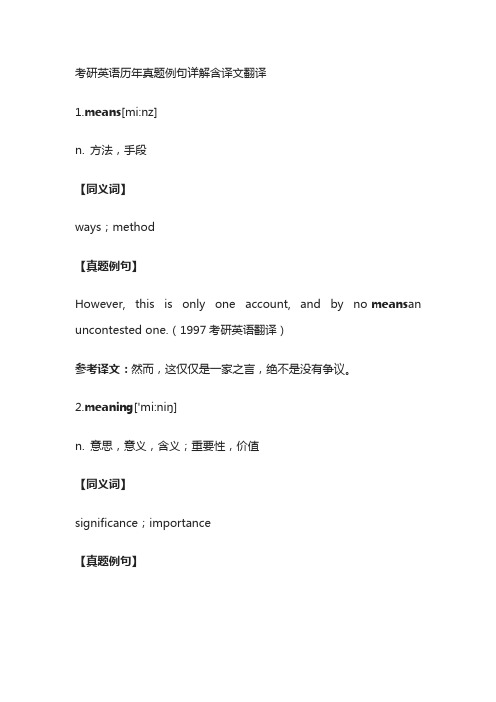
考研英语历年真题例句详解含译文翻译1.means[mi:nz]n. 方法,手段【同义词】ways;method【真题例句】However, this is only one account, and by no means an uncontested one.(1997考研英语翻译)参考译文:然而,这仅仅是一家之言,绝不是没有争议。
2.meaning['mi:niŋ]n. 意思,意义,含义;重要性,价值【同义词】significance;importance【真题例句】If you are unfamiliar with words or idioms, you guess at their meaning, using clues presented in the context.(2015考研英语新题型)参考译文:如果你不熟悉单词或习语,你会借助上下文的线索去猜测意思。
3.meantime['mi:n'taim]n. (meanwhile)其间,其时ad. 同时,当时【真题例句】In the meantime, thriving Spanish colonies had been established in Mexico, the West Indies, and South America.(2015考研英语翻译)参考译文:与此同时,西班牙在墨西哥、西印度群岛和南美洲建立了繁荣的殖民地。
4.meanwhile['mi:nwail]n. 其时,其间ad. 当时,与此同时【同义词】meantimeThe development of “cloud computing,”meanwhile, has made that exploration so much the easier.(2015考研英语阅读Text 2)参考译文:同时,“云计算”的发展让那种探索变得更加容易。
2012考研英语-新题型全文译文
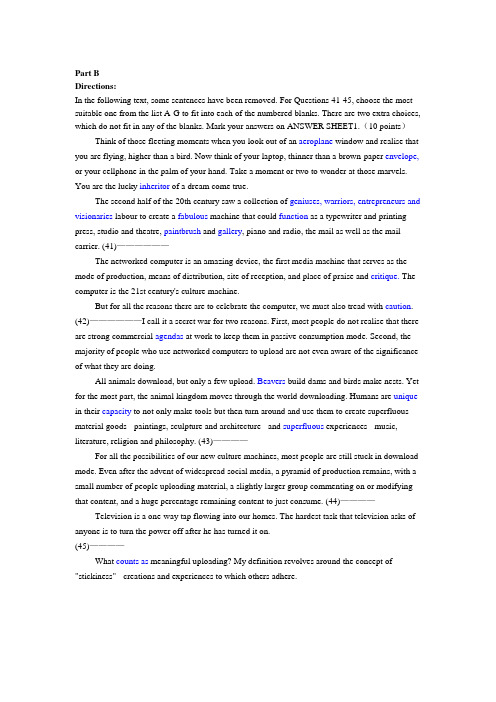
Part BDirections:In the following text, some sentences have been removed. For Questions 41-45, choose the most suitable one from the list A-G to fit into each of the numbered blanks. There are two extra choices, which do not fit in any of the blanks. Mark your answers on ANSWER SHEET1.(10 points)Think of those fleeting moments when you look out of an aeroplane window and realise that you are flying, higher than a bird. Now think of your laptop, thinner than a brown-paper envelope, or your cellphone in the palm of your hand. Take a moment or two to wonder at those marvels. You are the lucky inheritor of a dream come true.The second half of the 20th century saw a collection of geniuses, warriors, entrepreneurs and visionaries labour to create a fabulous machine that could function as a typewriter and printing press, studio and theatre, paintbrush and gallery, piano and radio, the mail as well as the mail carrier. (41)——————The networked computer is an amazing device, the first media machine that serves as the mode of production, means of distribution, site of reception, and place of praise and critique. The computer is the 21st century's culture machine.But for all the reasons there are to celebrate the computer, we must also tread with caution.(42)——————I call it a secret war for two reasons. First, most people do not realise that there are strong commercial agendas at work to keep them in passive consumption mode. Second, the majority of people who use networked computers to upload are not even aware of the significance of what they are doing.All animals download, but only a few upload. Beavers build dams and birds make nests. Yet for the most part, the animal kingdom moves through the world downloading. Humans are unique in their capacity to not only make tools but then turn around and use them to create superfluous material goods - paintings, sculpture and architecture - and superfluous experiences - music, literature, religion and philosophy. (43)————For all the possibilities of our new culture machines, most people are still stuck in download mode. Even after the advent of widespread social media, a pyramid of production remains, with a small number of people uploading material, a slightly larger group commenting on or modifying that content, and a huge percentage remaining content to just consume. (44)————Television is a one-way tap flowing into our homes. The hardest task that television asks of anyone is to turn the power off after he has turned it on.(45)————What counts as meaningful uploading? My definition revolves around the concept of "stickiness" - creations and experiences to which others adhere.[A] Of course, it is precisely these superfluous things that define human culture and ultimately what it is to be human. Downloading and consuming culture requires great skills, but failing to move beyond downloading is to strip oneself of a defining constituent of humanity.[B] Applications like , which allow users to combine pictures, words and other media in creative ways and then share them, have the potential to add stickiness by amusing, entertaining and enlightening others.[C] Not only did they develop such a device but by the turn of the millennium they had also managed to embed it in a worldwide system accessed by billions of people every day.[D] This is because the networked computer has sparked a secret war between downloading and uploading - between passive consumption and active creation - whose outcome will shape our collective future in ways we can only begin to imagine.[E] The challenge the computer mounts to television thus bears little similarity to one format being replaced by another in the manner of record players being replaced by CD players.[F] One reason for the persistence of this pyramid of production is that for the past half-century, much of the world's media culture has been defined by a single medium - television - and television is defined by downloading.[G]The networked computer offers the first chance in 50 years to reverse the flow, to encourage thoughtful downloading and, even more importantly, meaningful uploading.参考译文当你从飞机的窗口望出,想一想那飞逝即逝的瞬间,意识到你正在飞行,飞得比鸟还要高。
考研英语历年真题例句详解含译文翻译copyright
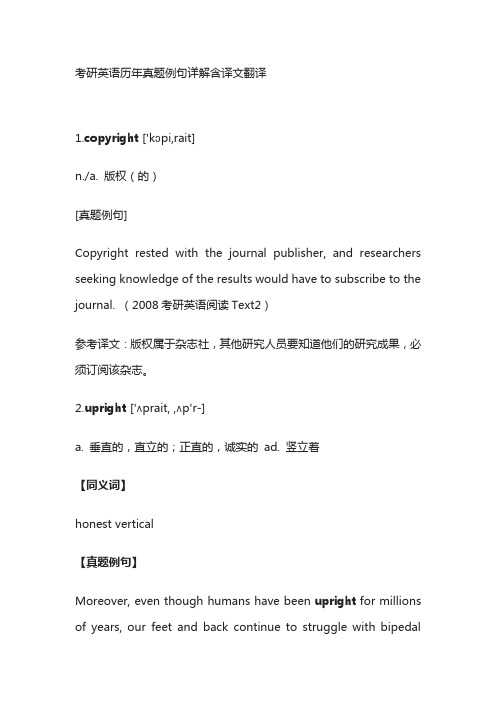
考研英语历年真题例句详解含译文翻译1.copyright ['kɔpi,rait]n./a. 版权(的)[真题例句]Copyright rested with the journal publisher, and researchers seeking knowledge of the results would have to subscribe to the journal. (2008考研英语阅读Text2)参考译文:版权属于杂志社,其他研究人员要知道他们的研究成果,必须订阅该杂志。
2.upright ['ʌprait, ,ʌp'r-]a. 垂直的,直立的;正直的,诚实的ad. 竖立着【同义词】honest vertical【真题例句】Moreover, even though humans have been upright for millions of years, our feet and back continue to struggle with bipedalposture and cannot easily withstand repeated strain imposed by oversize limbs.(2008阅读3)参考译文:此外,尽管人类已直立行走了几百万年,但两足和背部仍继续同两足行走的姿势相抗衡,因而难以轻易承受过大过长的肢体反复施加的压力。
3.rectangle['rek,tæŋɡl]n. [数]矩形,长方形【同义词】【真题例句】4.rectify ['rektifai]v. 纠正,整顿,[化]精馏【同义词】correct straighten up【真题例句】The comprehensive spending review offers an opportunity for the government to help rectify this. (2014 Text4)参考译文:全面的开支检讨为政府提供机会,协助纠正这一情况。
2012考研英语(一)翻译真题及答案
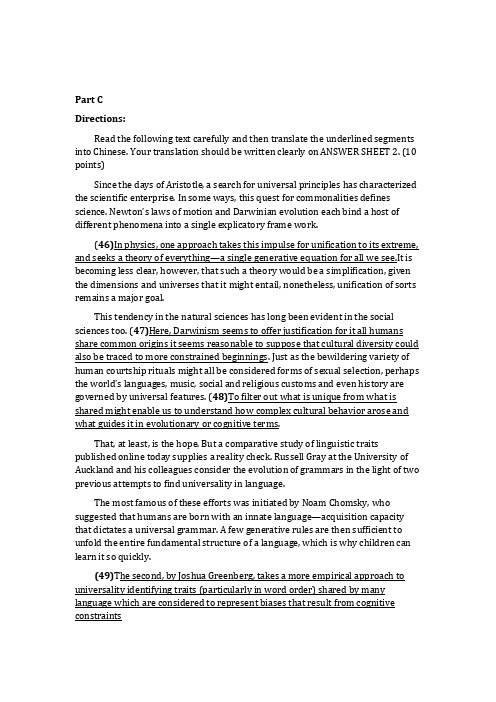
Part CDirections:Read the following text carefully and then translate the underlined segments into Chinese. Your translation should be written clearly on ANSWER SHEET 2. (10 points)Since the days of Aristotle, a search for universal principles has characterized the scientific enterprise. In some ways, this quest for commonalities defines science. Newton’s laws of motion and Darwinian evolution each bind a host of different phenomena into a single explicatory frame work.(46)In physics, one approach takes this impulse for unification to its extreme, and seeks a theory of everything—a single generative equation for all we see.It is becoming less clear, however, that such a theory would be a simplification, given the dimensions and universes that it might entail, nonetheless, unification of sorts remains a major goal.This tendency in the natural sciences has long been evident in the social sciences too. (47)Here, Darwinism seems to offer justification for it all humans share common origins it seems reasonable to suppose that cultural diversity could also be traced to more constrained beginnings. Just as the bewildering variety of human courtship rituals might all be considered forms of sexual selection, perhaps the world’s languages, music, social and religious customs and even history are governed by universal features. (48)To filter out what is unique from what is shared might enable us to understand how complex cultural behavior arose and what guides it in evolutionary or cognitive terms.That, at least, is the hope. But a comparative study of linguistic traits published online today supplies a reality check. Russell Gray at the University of Auckland and his colleagues consider the evolution of grammars in the light of two previous attempts to find universality in language.The most famous of these efforts was initiated by Noam Chomsky, who suggested that humans are born with an innate language—acquisition capacity that dictates a universal grammar. A few generative rules are then sufficient to unfold the entire fundamental structure of a language, which is why children can learn it so quickly.(49)The second, by Joshua Greenberg, takes a more empirical approach to universality identifying traits (particularly in word order) shared by many language which are considered to represent biases that result from cognitive constraintsGray and his colleagues have put them to the test by examining four family trees that between them represent more than 2,000 languages.(50)Chomsky’s grammar should show patterns of language change that are independent of the family tree or the pathway tracked through it. Whereas Greenbergian universality predicts strong co-dependencies between particular types of word-order relations. Neither of these patterns is borne out by the analysis, suggesting that the structures of the languages are lire age-specific and not governed by universals.翻译46. 在物理学领域,有一种方法将这种“万物归一的冲动”推向了极致,它试图探寻到能解释一切的,最底层的公式。
2012年考研英语阅读全文翻译

“来吧,大家都在这样做”,这句低声说出的话,有一半成分是邀请,一半是强迫,在听到“朋友压力”这个词时,大多数人会想到这句话。
这句话通常会导致毫无益处的事情——饮酒,吸毒以及随意的性行为。
在缇娜·罗森博格的新书《加入俱乐部》中认为同辈压力通过她所谓的“社会治愈”也可以成为一种积极的力量,在这种治愈中组织和官员可以利用这种集体动力的能量帮助提高人们的生活,甚至是那句话。
罗森博格是普利策奖的获得者,她列举了许多在运转的社会治愈的例子:在南卡罗莱纳州发起了一个叫做强烈反对烟雾的反吸烟项目,目的是使香烟不再酷。
在南美,发起了一个叫做热爱生活的艾滋预防项目,招募了年轻人在他们的朋友中宣传性安全。
这个想法似乎是可行的,她是一个有感知力的观察者。
他对于公共健康活动的软弱无力做出的评论正中要点:他们没有将同辈压力转变为健康的习惯,而且他们显示出了一种对心理学严重错误的理解。
“你敢与众不同吗,那就不要吸烟!”兴起了一个以在青年人中减少吸烟为目的的标语运动,这些青年人想做的只是融入。
罗森博格的建议令人信服:公共健康支持者应该向广告商取经,他们很擅长于应用同辈压力。
但对于社会治愈的综合效力,罗森博格并没有说服力。
她的书中充满了太多无关的细节,没有足够的社会和生物原因来解释同辈压力为何如此巨大。
我们可以看出社会治愈最明显的缺陷就是,从长期来看,它的作用并不好。
一旦资金被削减,反烟运动就会失败。
只有有限的和杂乱的证据可以证明热爱生活运动可以引起长远的改变。
毫无疑问我们的朋友圈对我们的行为产生巨大的影响。
一个新出现的研究机构表示,积极健康和坏习惯都通过社交在朋友圈中传播。
这是同辈压力一个隐秘的形式:我们会无意识的模仿我们每天看到的行为。
然而,很不确定的是,专家和官员如何能通过选择朋友圈来成功控制人们的行为使其朝着准确正确的方向。
这就像老师将后排惹是生非的学生群分开,让他们与好学生坐一起。
这种策略从来没有有效过。
而这也是从外部进行社会治愈所面临的一个问题:在现实生活中,朋友是个人的选择,而不是外部的分配。
考研英语历年真题例句详解含译文翻译Surge

考研英语历年真题例句详解含译文翻译Surge1.surgeon ['sə:dʒən]n. 外科医生【同义词】sawbones chirurgeon【真题例句】Supreme Court Justice Sandra Day O’Connor is in her 70s, and former surgeon general C. Everett Koop chairs an Internet start-up in his 80s.(2003阅读4)参考译文:最高法院法官桑德拉·欧康奈70有余,前卫生局医务主任C. Everett Koop 80多岁还出任了一家互联网创业公司的CEO。
2.surgery ['sə:dʒəri]n. 外科,外科学;手术室,诊疗室【同义词】theater surgical department【真题例句】A robot that can fulfill delicate tasks like performing brain surgery.(2002阅读2选项)参考译文:机器人可以完成很多细致的任务,如做脑部手术。
3.suicide ['sjuisaid]n. 自杀;自杀行为;自杀者a. 自杀的vt. 自杀vi. 自杀【同义词】dutch act self-destruction【真题例句】There is another way to commit evolutionary suicide.(2000阅读2)参考译文:另一种进行进化性自杀的方法。
Sure1.assure [ə'ʃuə]vt. 使确信,使放心;(of)向…保证/担保【同义词】ensure[真题例句]When assured that they do, she replied, “Then I would have to say yes.”(2003考研英语阅读Text 2)参考译文:当被告知的确如此,她回答道:“那么我不得不说,是的,我反对接种。
2012年全国硕士研究生入学统一考试(英语一)试题答案和解析
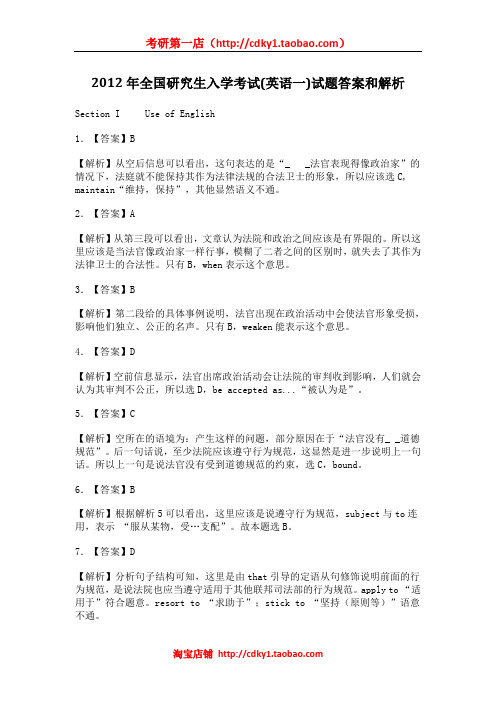
2012年全国研究生入学考试(英语一)试题答案和解析Section I Use of English1.【答案】B【解析】从空后信息可以看出,这句表达的是“_ _法官表现得像政治家”的情况下,法庭就不能保持其作为法律法规的合法卫士的形象,所以应该选C, maintain“维持,保持”,其他显然语义不通。
2.【答案】A【解析】从第三段可以看出,文章认为法院和政治之间应该是有界限的。
所以这里应该是当法官像政治家一样行事,模糊了二者之间的区别时,就失去了其作为法律卫士的合法性。
只有B,when表示这个意思。
3.【答案】B【解析】第二段给的具体事例说明,法官出现在政治活动中会使法官形象受损,影响他们独立、公正的名声。
只有B,weaken能表示这个意思。
4.【答案】D【解析】空前信息显示,法官出席政治活动会让法院的审判收到影响,人们就会认为其审判不公正,所以选D,be accepted as...“被认为是”。
5.【答案】C【解析】空所在的语境为:产生这样的问题,部分原因在于“法官没有_ _道德规范”。
后一句话说,至少法院应该遵守行为规范,这显然是进一步说明上一句话。
所以上一句是说法官没有受到道德规范的约束,选C,bound。
6.【答案】B【解析】根据解析5可以看出,这里应该是说遵守行为规范,subject与to连用,表示“服从某物,受…支配”。
故本题选B。
7.【答案】D【解析】分析句子结构可知,这里是由that引导的定语从句修饰说明前面的行为规范,是说法院也应当遵守适用于其他联邦司法部的行为规范。
apply to “适用于”符合题意。
resort to “求助于”;stick to “坚持(原则等)”语意不通。
8.【答案】B【解析】空所在的语境为,类似这样的案例提出了这样一个问题:法院和政治之间是否还存在着界限。
提出问题,产生问题用只能选raise。
9.【答案】A【解析】根据第8题可知,空内应填line,“界限”。
2012年考研英语一真题及答案
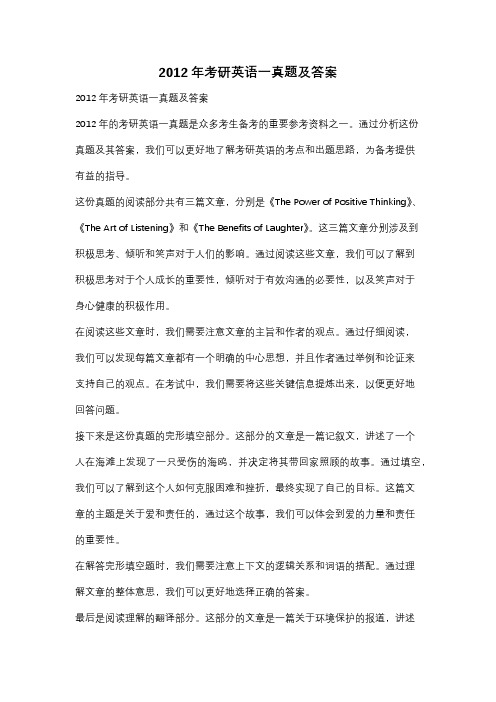
2012年考研英语一真题及答案2012年考研英语一真题及答案2012年的考研英语一真题是众多考生备考的重要参考资料之一。
通过分析这份真题及其答案,我们可以更好地了解考研英语的考点和出题思路,为备考提供有益的指导。
这份真题的阅读部分共有三篇文章,分别是《The Power of Positive Thinking》、《The Art of Listening》和《The Benefits of Laughter》。
这三篇文章分别涉及到积极思考、倾听和笑声对于人们的影响。
通过阅读这些文章,我们可以了解到积极思考对于个人成长的重要性,倾听对于有效沟通的必要性,以及笑声对于身心健康的积极作用。
在阅读这些文章时,我们需要注意文章的主旨和作者的观点。
通过仔细阅读,我们可以发现每篇文章都有一个明确的中心思想,并且作者通过举例和论证来支持自己的观点。
在考试中,我们需要将这些关键信息提炼出来,以便更好地回答问题。
接下来是这份真题的完形填空部分。
这部分的文章是一篇记叙文,讲述了一个人在海滩上发现了一只受伤的海鸥,并决定将其带回家照顾的故事。
通过填空,我们可以了解到这个人如何克服困难和挫折,最终实现了自己的目标。
这篇文章的主题是关于爱和责任的,通过这个故事,我们可以体会到爱的力量和责任的重要性。
在解答完形填空题时,我们需要注意上下文的逻辑关系和词语的搭配。
通过理解文章的整体意思,我们可以更好地选择正确的答案。
最后是阅读理解的翻译部分。
这部分的文章是一篇关于环境保护的报道,讲述了人类活动对于环境的破坏和对策。
通过翻译这篇文章,我们可以了解到环境问题的严重性以及应对环境问题的方法。
这篇文章的主题是关于环境保护的,通过这个报道,我们可以认识到环境保护对于人类的重要性。
在翻译这篇文章时,我们需要注意词汇的准确性和句子的结构。
通过理解原文的意思,我们可以更好地进行翻译,同时还需要注意语法和语言表达的准确性。
综上所述,2012年的考研英语一真题及答案是备考的重要参考资料。
2012考研英语(一)写作真题解析与参考范文

2012考研英语(一)写作真题解析与参考范文2012考研英语(一)写作真题解析与参考范文1、小作文:Directions: Some international students are coming to your university. Write them an email in the name of the Students' Union to1) extend your welcome and2) provide some suggestions for their campus life here.You should write about 100 words on ANSWER SHEET2.Do not sign your own name at the end of the letter, Use "Li Ming" instead.Do not write the address.(10 points).命题解析:在2011年所有的面授及讲座中,笔者均预测2012年英语(一)小作文70%的可能性是考察书信。
不出所料,今年再次考察了从2005年至2011年已经连续考察过六次的书信。
值得高度关注的是,今年再次考察了考研已经考察过四次的建议信:2007年给图书馆提建议、2008年给房东道歉加建议、2009年给编辑提建议、2011年英语(二)祝贺表弟入学并提建议。
尤其与2011年英语(二)的建议信颇为相似,均为关于大学生活提出建议。
再次提醒广大考生:反押题的逆向出题方式才是考研的命题方式!切勿以为考过的题型不会重考,真题才是最宝贵的复习资源!2011年笔者讲授的北京新东方学校各类考研写作课程均提供了小作文10大必背范文,其中均有1-3篇建议信,尤其是提供的招新启事前两段今年小作文均可使用。
拙著《2012考研英语高分写作》第63至64页详细讲解了建议信的注意事项、写作方法,并提供了经典范文与万能句型;第二章第五节详细解析了2007至2009年三年的建议信真题,各提供了两篇经典范文、参考译文与范文详解。
2012年考研英语(一)真题参考答案

一. 完型填空1--5 BABDC 6--10 BDBAB 11--15 ACCDA 16--20 CACDD二. 阅读答案21--25 DBACD 26--30 CDADA 31--35 ABBDC 36--40 CDBCA三. 新题型答案41. C 42. D 43. A 44. F 45. G四. 翻译参考译文46. 在物理学上,一种方法(物理学上的一种方法)把这种统一性的冲动发挥到了极点,并努力寻找一种万能的理论,即唯一的一条为我们都明白的一切东西所创造或生成的公式/方法。
47. 在这里,达尔文的理论似乎提供了一个理由或依据,因为如果所有的人类都有共同的起源,那么文化多样性也能够追溯到更多可控的起源,持这样的观点似乎是有道理的。
48. 从我们的共性中过滤出独特性能够让我们理解复杂的文化行为是怎样出现的,以及用进化或认知的概念来说,是什么在引导这种文化行为。
49.由约华格林伯根提出的第二个观点,采取了一个更为经验主义的普遍性方法,识别出了许多语言所共有的特征(特别是词序方面),这些特征被认为是代表了由认知限制所造成的偏见。
50. 乔姆斯基的语法应该说明了语言变化的模式,这些模式和语言这个家族或通过这个家族所追溯的这个路径是无关的,而格林伯根的普遍性预测了某些特定词序关系之间紧密的相互依赖性。
五. 作文参考范文51. 小作文参考范文(参见作文冲刺班课程授课内容和讲义第24页写法)Dear my friends,I am writing this letter to welcome you to our university on behalf of our Students’ Union. I expect you to arrive here with increasing joy as well as excitement. It is of great pleasure to anticipate your coming soon.As foreign students, you will find everything on our campus quite different, fresh and alien. Therefore, after arriving, you can take full advantage of every opportunity to communicate with us directly to bridge the gap. To be more specific, the climate in Beijing is considerably different from your hometown, but you will soon get accustomed to living here. Finally, I hope to accompany you and introduce some special or unique campus characteristics and cultures so as to let you be better acquainted with/understand our campus life.We shall strive to make your stay or visit as pleasant as possible by providing the best service as well as support for you. All of our students are looking forward to your early coming eagerly.Yours sincerely,Li Ming52. 大作文 Sample WritingAs is apparently drawn in this miniature, in the middle stand two individuals, one feeling gloomy while the other optimistic. The Chinese characters above inform our readers of the message that various folks take different attitudes toward the same event. (参见黄涛冲刺班作文讲义第8页第一段首句必杀句型)How impressive this drawing seems to be in depicting one of the most prevalent themes that attitudes make everything in our life.After careful reflection and mediation, we examinees come to understand the enlightening drawing. I contend that this thought-provoking image conveys one profound layer of implication concerning attitude or optimism. It is universally acknowledged that life is by no means perfect and whether we feel optimistic or not depends on what attitudes we take. (参见黄涛冲刺班讲义第3页作文经典句型必备)When confronted with an adverse situation, some youths feel in low spirits and fall into depression. Others, on the contrary, look at the positive side of the situation and remain cheerful. As a consequence, it is our attitude rather than the situation itself that determines how we feel. (参见启航冲刺讲义第13页第30个段落正反论证法)In my personal sense, the message applies to our youths especially. In such a rat-race society, everyone is bound to encounter hardships and difficulties. In this sense, I should keep an optimistic attitude to pullthrough any hardship. Just as a famous figure puts it, it is our attitude that has changed everything in our life. (参见作文冲刺讲义第7页作文九大高分句式之引用名人名言)更多经典高分句型可以参考40页的黄涛作文冲刺资料,按照自己喜欢的背诵的高分句子来造就自己的高分作文。
考研英语历年真题例句详解含译文翻译sister

考研英语历年真题例句详解含译文翻译Sist1.sister ['sistə]n. 姐,妹;护士长;修女,女教士2.assist [ə'sist]vt. 协助,帮助,促进vi. 帮忙,参加【同义词】help[真题例句]Modem medicine has assisted terminally ill patients in painless recovery.(2002考研英语阅读Text 4选项)参考译文:现代医学一直在帮助那些疾病晚期的病人进行无痛康复。
3.assistant [ə'sistənt]a. 帮助的,辅助的n. 助手,助教;辅助物[真题例句]Said Tom Cortina, the assistant dean at camegie Mellon’s school of computer science.。
(2016考研英语阅读Text 1)参考译文:卡梅吉梅隆大学计算机科学学院(camegie Mellon’s school of computer science)的副院长汤姆科尔蒂娜(Tom Cortina)说4.assistance [ə'sistəns]n. 协助;帮助;援助;;[同义词]help aid assistance5.consist[kən'sist]v. (in)在于,存在于;(of)由…组成,由…构成[同义词]compose[真题例句]Yet a considerable number of the most significant collections of criticism published in the 20th century consisted in large part of newspaper reviews. (2010考研英语阅读Text1)参考译文:然而,在20世纪出版的大量具有最重要意义的评论文集中报刊评论占了很大部分。
2012考研英语(一)阅读翻译及解析
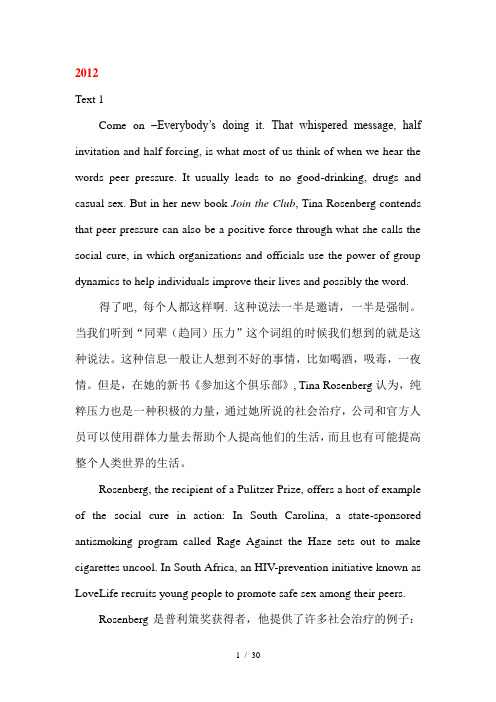
2012Text 1Come on –Everybody’s doing it. That whispered message, half invitation and half forcing, is what most of us think of when we hear the words peer pressure. It usually leads to no good-drinking, drugs and casual sex. But in her new book Join the Club, Tina Rosenberg contends that peer pressure can also be a positive force through what she calls the social cure, in which organizations and officials use the power of group dynamics to help individuals improve their lives and possibly the word.得了吧, 每个人都这样啊. 这种说法一半是邀请,一半是强制。
当我们听到“同辈(趋同)压力”这个词组的时候我们想到的就是这种说法。
这种信息一般让人想到不好的事情,比如喝酒,吸毒,一夜情。
但是,在她的新书《参加这个俱乐部》, Tina Rosenberg认为,纯粹压力也是一种积极的力量,通过她所说的社会治疗,公司和官方人员可以使用群体力量去帮助个人提高他们的生活,而且也有可能提高整个人类世界的生活。
Rosenberg, the recipient of a Pulitzer Prize, offers a host of example of the social cure in action: In South Carolina, a state-sponsored antismoking program called Rage Against the Haze sets out to make cigarettes uncool. In South Africa, an HIV-prevention initiative known as LoveLife recruits young people to promote safe sex among their peers.Rosenberg是普利策奖获得者,他提供了许多社会治疗的例子:在南卡罗莱纳州,一个州资助的反对抽烟的项目叫做“向烟雾宣战”就旨在控制好烟草销售。
2012年1月考研英语一小作文(标准版)
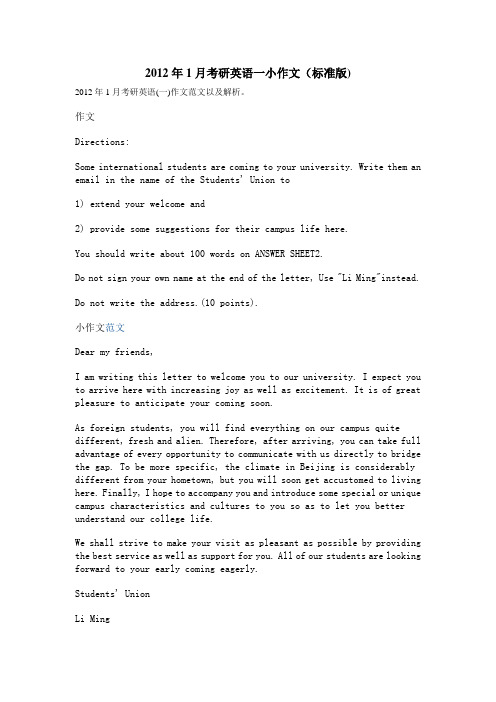
2012年1月考研英语一小作文(标准版)2012年1月考研英语(一)作文范文以及解析。
作文Directions:Some international students are coming to your university. Write them an email in the name of the Students' Union to1) extend your welcome and2) provide some suggestions for their campus life here.You should write about 100 words on ANSWER SHEET2.Do not sign your own name at the end of the letter, Use "Li Ming"instead.Do not write the address.(10 points).小作文范文Dear my friends,I am writing this letter to welcome you to our university. I expect you to arrive here with increasing joy as well as excitement. It is of great pleasure to anticipate your coming soon.As foreign students, you will find everything on our campus quite different, fresh and alien. Therefore, after arriving, you can take full advantage of every opportunity to communicate with us directly to bridge the gap. To be more specific, the climate in Beijing is considerably different from your hometown, but you will soon get accustomed to living here. Finally, I hope to accompany you and introduce some special or unique campus characteristics and cultures to you so as to let you better understand our college life.We shall strive to make your visit as pleasant as possible by providing the best service as well as support for you. All of our students are looking forward to your early coming eagerly.Students' UnionLi MingDear friends,I am very glad to hear that you would come to our school. Firstly I will extend to you our warmest welcome, and we are looking forward to the coming learning.Before you come here, I will try to make some useful suggestions for you. First of all, it is better to learn Chinese well as soon as possible. Perhaps it's not easy to master a language in a short time, but it is very important in your daily life. Secondly, it is necessary to know some cultural differences between two countries. Otherwise, you will meet some unnecessary troubles.At last, you should get to know the weather and prepare for the cloths in each season.We are looking forward to seeing you soon and wish everything goes well.Sincerely yours,Li Ming这篇小作文是考过三次的建议信,我原本预计今年考投诉信,没有想到英语二用了投诉信,而英语一用的还是建议信,呵呵,看来出题的老师没有太多的思路可以展拓了,好在今年没有考摘要,原本预计有30%的可能考摘要的,那样就麻烦了,没有模板~~~哈哈这篇建议信四平八稳,可以说只要读懂题目,应该得到6分以上的分数。
2012考研英语(一)阅读翻译及解析
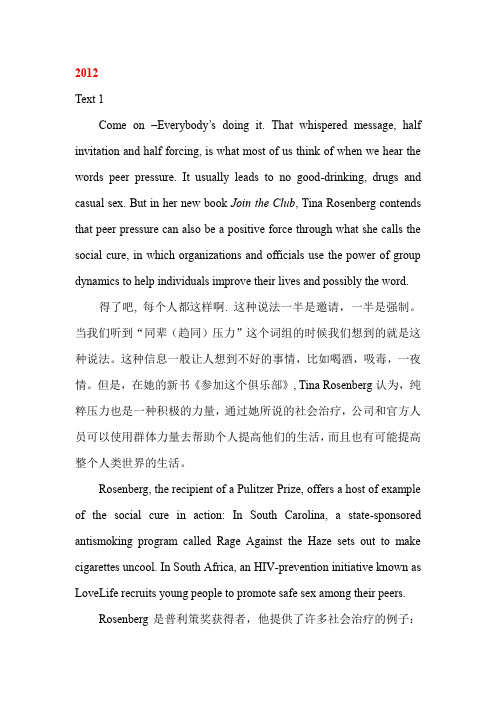
2012Text 1Come on –Everybody’s doing it. That whispered message, half invitation and half forcing, is what most of us think of when we hear the words peer pressure. It usually leads to no good-drinking, drugs and casual sex. But in her new book Join the Club, Tina Rosenberg contends that peer pressure can also be a positive force through what she calls the social cure, in which organizations and officials use the power of group dynamics to help individuals improve their lives and possibly the word.得了吧, 每个人都这样啊. 这种说法一半是邀请,一半是强制。
当我们听到“同辈(趋同)压力”这个词组的时候我们想到的就是这种说法。
这种信息一般让人想到不好的事情,比如喝酒,吸毒,一夜情。
但是,在她的新书《参加这个俱乐部》, Tina Rosenberg认为,纯粹压力也是一种积极的力量,通过她所说的社会治疗,公司和官方人员可以使用群体力量去帮助个人提高他们的生活,而且也有可能提高整个人类世界的生活。
Rosenberg, the recipient of a Pulitzer Prize, offers a host of example of the social cure in action: In South Carolina, a state-sponsored antismoking program called Rage Against the Haze sets out to make cigarettes uncool. In South Africa, an HIV-prevention initiative known as LoveLife recruits young people to promote safe sex among their peers.Rosenberg是普利策奖获得者,他提供了许多社会治疗的例子:在南卡罗莱纳州,一个州资助的反对抽烟的项目叫做“向烟雾宣战”就旨在控制好烟草销售。
文都2012考研英语高端班翻译参考译文(徐可风)
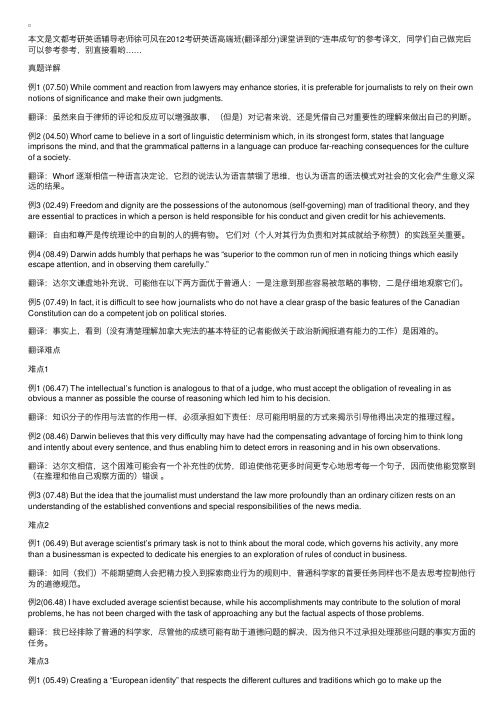
本⽂是⽂都考研英语辅导⽼师徐可风在2012考研英语⾼端班(翻译部分)课堂讲到的“连串成句”的参考译⽂,同学们⾃⼰做完后可以参考参考,别直接看哟……真题详解例1 (07.50) While comment and reaction from lawyers may enhance stories, it is preferable for journalists to rely on their own notions of significance and make their own judgments.翻译:虽然来⾃于律师的评论和反应可以增强故事,(但是)对记者来说,还是凭借⾃⼰对重要性的理解来做出⾃⼰的判断。
例2 (04.50) Whorf came to believe in a sort of linguistic determinism which, in its strongest form, states that language imprisons the mind, and that the grammatical patterns in a language can produce far-reaching consequences for the culture of a society.翻译:Whorf 逐渐相信⼀种语⾔决定论,它烈的说法认为语⾔禁锢了思维,也认为语⾔的语法模式对社会的⽂化会产⽣意义深远的结果。
例3 (02.49) Freedom and dignity are the possessions of the autonomous (self-governing) man of traditional theory, and they are essential to practices in which a person is held responsible for his conduct and given credit for his achievements.翻译:⾃由和尊严是传统理论中的⾃制的⼈的拥有物。
2012考研英语(一)翻译真题及答案

Part CDirections:Read the following text carefully and then translate the underlined segments into Chinese. Your translation should be written clearly on ANSWER SHEET 2. (10 points)Since the days of Aristotle, a search for universal principles has characterized the scientific enterprise. In some ways, this quest for commonalities defines science. Newton’s laws of motion and Darwinian evolution each bind a host of different phenomena into a single explicatory frame work.(46)In physics, one approach takes this impulse for unification to its extreme, and seeks a theory of everything—a single generative equation for all we see.It is becoming less clear, however, that such a theory would be a simplification, given the dimensions and universes that it might entail, nonetheless, unification of sorts remains a major goal.That, at least, is the hope. But a comparative study of linguistic traits published online today supplies a reality check. Russell Gray at the University of Auckland and his colleagues consider the evolution of grammars in the light of two previous attempts to find universality in language.The most famous of these efforts was initiated by Noam Chomsky, who suggested that humans are born with an innate language—acquisition capacity that dictates a universal grammar. A few generative rules are then sufficient to unfold the entire fundamental structure of a language, which is why children can learn it so quickly.翻译46. 在物理学领域,有一种方法将这种“万物归一的冲动”推向了极致,它试图探寻到能解释一切的,最底层的公式。
考研英语历年真题例句详解含译文翻译pressure

考研英语历年真题例句详解含译文翻译1.pressure['preʃə]n. 压,压力,压迫,强制,紧迫,困苦,困难【真题例句】They fail to mobilize peer pressure for healthy habits, and they demonstrate a seriously flawed understanding of psychology.(2012考研英语阅读Text 1)参考译文:它们没能调动起同伴压力以促进健康习惯的生成,且它们证实了对心理的严重错误的理解。
press [kəm'pres, 'kɔmpres]vt. 压紧,压缩;(把思想、文字等)浓缩【同义词】condense;[真题例句]Rather than have people simply rate their beauty compress with others, he asked them to identify an original photogragh of themselves’from a lineup including versions that had beenaltered to appear more and less attractive. (2016考研英语阅读text2)参考译文:他没有让人们简单地给自己的美容产品打分,而是让他们从一组照片中辨认出一张自己的原创照片,其中包括一些经过修改、变得或多或少更有些吸引力的照片。
3.depress [di'pres]v. 压抑,降低;使沮丧,压下[同义词]suppress[真题例句]“We wake up from dreams happy or depressed, and those feelings can stay with us all day.”(2005考研英语阅读Test3)参考译文:“我们从梦中醒来,或高兴或沮丧,而这些情绪会伴随我们一整天。
- 1、下载文档前请自行甄别文档内容的完整性,平台不提供额外的编辑、内容补充、找答案等附加服务。
- 2、"仅部分预览"的文档,不可在线预览部分如存在完整性等问题,可反馈申请退款(可完整预览的文档不适用该条件!)。
- 3、如文档侵犯您的权益,请联系客服反馈,我们会尽快为您处理(人工客服工作时间:9:00-18:30)。
2012年研究生入学考试英语(一)翻译部分参考译文2012年研究生入学考试英语一的翻译文章出自美国杂志《Nature》,题目是Universal truths。
这篇文章的理论性比较强,对于大家来说应该会感觉很有难度,大家首先要理解文章大意,依据专业性来定词义。
文章原文如下,选入2012考研英语一翻译真题时有部分删改:Since at least the days of Aristotle, a search for universal principles has characterized the scientific enterprise. In some ways, this quest for commonalities defines science: without it, there is no underlying order and pattern, merely as many explanations as there are things in the world. Newton's laws of motion, the oxygen theory of combustion and Darwinian evolution each bind a host of different phenomena into a single explicatory framework.46. In physics, one approach takes this impulse for unification to its extreme, and seeks a theory of everything —a single generative equation for all we see. It is becoming less clear, however, that such a theory would be a simplification, given the proliferation of dimensions and universes that it might entail. Nonetheless, unification of sorts remains a major goal.46. 在物理学上,一种方法就是把这种寻求统一性的冲动发挥到了极端,并努力寻找一种万能的理论,即一条唯一的为我们都看到的一切所生成的公式。
This tendency in the natural sciences has long been evident in the social sciences too. 47. Here, Darwinism seems to offer justification, for if all humans share common origins, it seems reasonable to suppose that cultural diversity could also be traced to more constrained beginnings.47. 在这里,达尔文之说似乎提供了一个理由,因为如果所有的人类都有共同的起源,那么文化多样性也能够追溯到更为有限的起源,这似乎是有道理的。
Just as the bewildering variety of human courtship rituals might all be considered to be forms of sexual selection, perhaps the world's languages, music, social and religious customs and even history are governed by universal features. 48. To filter out what is unique from what is shared might enable us to understand how complex cultural behavior arose and what guides it in evolutionary or cognitive terms.48. 从共性中过滤出独特性能够使我们理解复杂的文化行为是怎样出现的,以及用进化或认知的概念来说,是什么在引导这种文化行为。
That, at least, is the hope. But a comparative study of linguistic traits published online today (M. Dunn et al. Nature doi:10.1038/nature09923; 2011) supplies a reality check. Russell Gray at the University of Auckland, New Zealand, and his colleagues consider the evolution of grammars in the light of two previous attempts to find universality in language.The most famous of these efforts was initiated by Noam Chomsky, who postulated that humans are born with an innate language-acquisition capacity — a brain module or modules specialized for language — that dictates a universal grammar. A few generative rules are then sufficient to unfold the entire fundamental structure of a language, which is why children can learn it so quickly. Languages would diversify through changes to the 'parameter settings' of the generative rules.49.The second, by Joshua Greenberg, takes a more empirical approach to universality, identifying traits (particularly in word order) shared by many languages, which are considered to represent biases that result from cognitive constraints. Chomsky's and Greenberg's are not the only theories on the table for how languages evolve, but they make the strongest predictions about universals.49.第二种努力,就是由约书亚格林伯做出的,就是采取一个更为经验主义的普遍性方法,来识别许多语言所共有的特征(特别是词序方面),这些特征认为是代表了由认知限制所引起的倾向。
Gray and his colleagues have put them to the test by examining four family trees that between them represent more than 2,000 languages. 50. Chomsky's grammar should show patterns of language change that are independent of the family tree or the pathway tracked through it, whereas Greenberg Ian universality predicts strong co-dependencies between particular types of word-order relations. Neither of these patterns is borne out by the analysis, suggesting that the structures of the languages arelineage-specific and not governed by universals.50.乔姆斯基的语法应该显示出语言变化的模式,这些模式并不受语言谱系或贯穿谱系路径的影响,而格林堡式的普遍性则预言了特定的语法次序关系类型之间所存在的紧密相互关系。
This does not mean that cognitive constraints are irrelevant, or that there are no other universals dictated by communication efficiency. It is surely inevitable that cognition sets limits on, say, word length. But such 'universals' seem likely to be relatively trivial features of languages, just as may be the case for putative universals in music and other aspects of culture.The conclusion? We should perhaps learn the lesson of Darwinism: a'universal' mechanism of adaptation says little in itself about how a particular feature got to be the way it is, or about how it works. This truth has dawned on physicists too: universal equations are all very well, but the world actually consists of particular solutions, and these are generally the result of contingent history. One size does not always fit all.。
